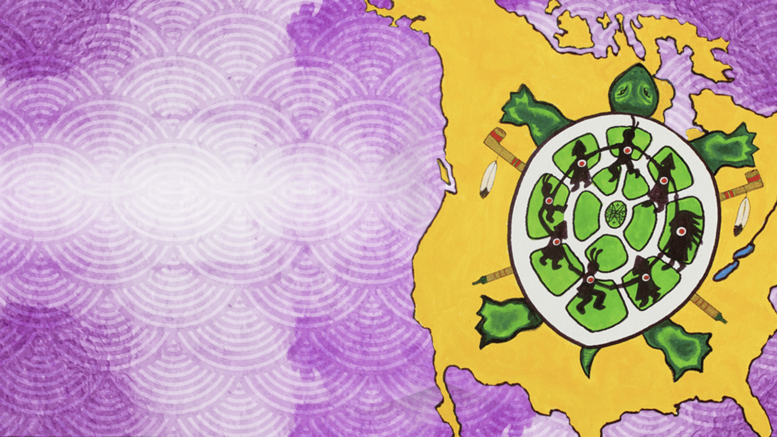By Jeremy Appel, Local Journalism Initiative Reporter
(ANNews) – Starting on Dec. 6, delegates to the Assembly of First Nations (AFN) will elect a new national chief in a hybrid event that will occur online over Zoom and in-person at the Shaw Centre in Ottawa.
The three-day Special Chiefs Assembly kicks off Dec. 5, with a grand entry and opening remarks from interim national chief Joanna Bernard and, in the evening, an all-candidates forum.
Voting begins the following morning at 9 a.m., with first ballot results announced at 4 p.m. The election follows a ranked-ballot system, meaning delegates will rank their preferences for national chief, with each round eliminating the candidate with the least amount of votes.
Those votes are then re-allocated to the delegates’ next choice. The process continues until one candidate receives a majority of votes.
Nominations for the national chief election opened on Oct. 11 and closed at the end of Nov. 1.
The AFN, which represents more than 600 First Nations across Canada, is governed by an executive committee, which includes the national chief, as well as regional chiefs from each province and territory.
The election was triggered by the ouster of former national chief Roseanne Archibald in June due to allegations she created a toxic workplace, which she strongly denies. Seventy-one per cent of delegates supported her removal. Soon after, delegates voted in favour of the new election date.
There are six candidates on the ballot. There are two candidates from nations in Saskatchewan, two from Manitoba, one from Alberta and one from Ontario.
The first person to announce their candidacy was David Pratt, the Federation of Sovereign Indigenous Nations vice-chief, who announced his intention in August — well in advance of nominations officially opening.
He told CBC News his priorities as national chief would be child welfare, missing and murdered Indigenous Women and Girls, and natural resource development.
Pratt expressed a desire for “our chiefs and our member nations have a share in the prosperity and all of the development of the resources of this land.”
Craig Makinaw, the former AFN regional chief for Alberta and former chief of Ermineskin Cree Nation in Maskwacis, is a co-founder of Natural Law Energy, which promotes Indigenous involvement in the natural resource sector.
In an interview with APTN News, Makinaw said the AFN needs to do a better job at serving as the advocacy body for chiefs across Canada in negotiations with the federal government, rather than promoting its own agenda. He also seeks to prioritize “wellness issues.”
At an all-candidates forum in Manitoba, Makinaw said chiefs need to proactively protect membership rights in discussions over the Indian Act’s future.
Reginald Bellerose, the former chief of Muskowekwan First Nation in Saskatchewan, who came in second in the previous AFN national chief election in 2021, is giving it another try.
Bellerose, who has served as the chair of the Saskatchewan Indian Gaming Authority for the past eight years, said he would like to develop a national gaming strategy as national chief. First Nations in Saskatchewan have a revenue-sharing agreement with the provincial government, which he would like to emulate federally.
He also pledged to prioritize addressing Indigenous deaths in custody and landfill searches for the remains of missing and murdered Indigenous women and girls in the Winnipeg area.
Manitoba Regional Chief Cindy Woodhouse, who hails from Pinaymootang First Nation, said one of her first priorities if elected will be to have a “big discussion” with the federal government on Indigenous policing jurisdiction.
Woodhouse was the lead negotiator for a class-action lawsuit against the feds for chronically underfunding care for 300,000 Indigenous youth and families in the child welfare system, which resulted in a $23-billion compensation agreement, in addition to $20 billion pledged towards improving the system.
Sheila North, an advocate for missing and murdered Indigenous women who is the former grand chief of Manitoba Keewatinowi Okimakanak, cited the importance of the AFN’s “relationships with our grassroots.”
“It’s very important for an organization to be inclusive and to be responsive to the people that it represents. The chiefs, first of all, but also the communities at the community level,” North told APTN. “I’m hearing a lot from the community level that there is a disconnect.”
She added that she would prioritize “bannock and tea issues, also known as bread and butter issues.”
Dean Sayers was the long-time chief of Batchewana First Nation in northern Ontario until his defeat this summer.
He told APTN there needs to be a “reconciliation approach” within the AFN after the tumult of Archibald’s tenure.
Sayers, who represented Ontario’s chiefs on the AFN’s charter renewal committee, called the existing charter “archaic” and ripe for reform. He added that the AFN’s “mandate needs to be broadened, needs to be brought up to speed [and] needs to be modernized.”
The AFN, he added, needs to do more than advocate for chiefs.
In order to be eligible for national chief, candidates were required to be over 18 years of age, of First Nations ancestry, belong to a First Nations in good standing with the AFN, and have the endorsement of 15 chiefs who are AFN members, with eight of those chiefs being from outside the province where the nominee resides.
In addition to the special election, AFN delegates are slated to vote on resolutions for a nation-wide First Nations homelessness action plan, and language funding and health care, among other priorities.



My father, not native, was in those Netherlands region. Thats a tight bond that I feel to others in that area and that war. He was in the 82airborn.
Love’yall.